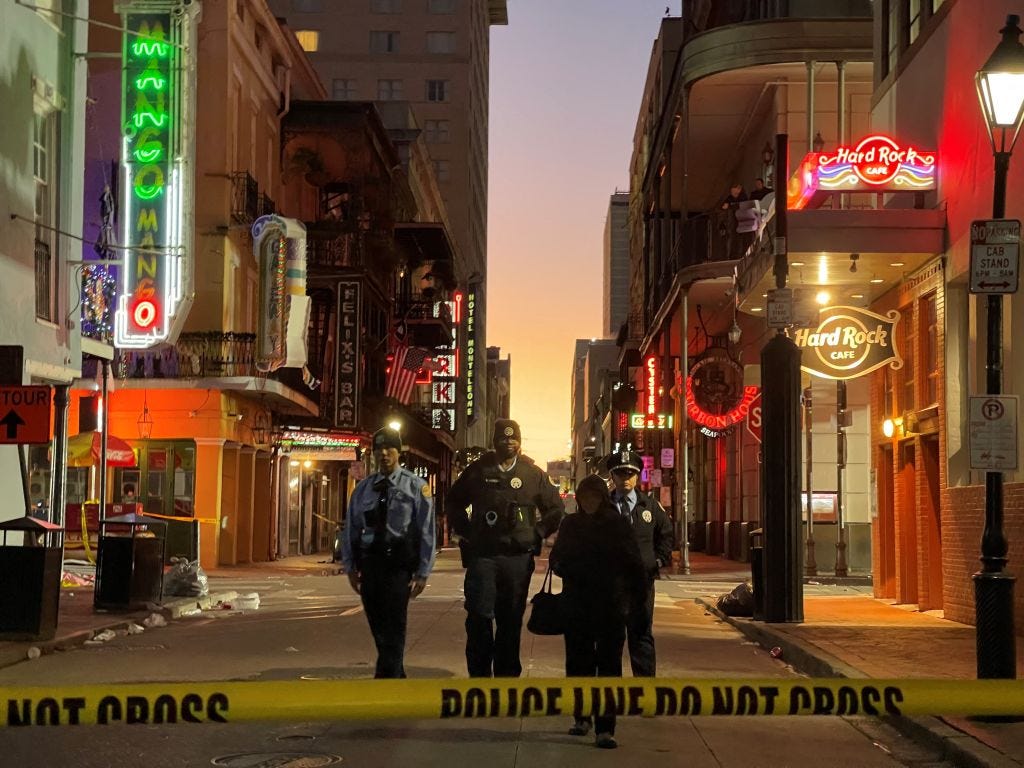2025 was only hours old when we got news of the year’s first mass murder. New Orleans: 15 dead and 35 injured so far, the alleged murderer a native Texan, an Army veteran, a gun owner, driving a Ford F-150. A by-now-all-too-familiar American story.
He was consumed with overwhelming anger about his divorces, and had a restraining order against him. As a returning veteran, he struggled to find his place in civilian life, and with the VA. His family had watched him descend into a rabbit hole of radicalization over the past year, he threatened to kill his ex-wife and children, he lost his business and his savings and was drowning in debt, he’d lost touch with reality and abandoned his old life, the well-liked and respected professional becoming, perhaps, a member of a terror cell. Those are all-too-familiar American stories, too.
Shamsud-Din Jabbar had become a devout and increasingly conservative Muslim in recent years, and reportedly flew the ISIS black banner during the attack. The political meaning of all of that’s still unclear, beyond the fact that it prodded the incoming president (sensitive as he typically is to the needs of his audience, if not to the actual needs of the American people) to jump to identify the driver as an undocumented immigrant, grist for the mill of resentment that’s served him so well electorally and plugs not just into Americans’ deep-seated post-9/11 fears and anxieties over terrorism, but also to the newly inflamed fears and anxieties about the supposed rise in the crime rate that Trump and his ilk have done so much to stoke.
Jabbar’s brother pointed to “radicalization, not religion,” and he’s onto something. It is tempting to see such an attack and look abroad for explanations. But what if all the explanation we need is in our own backyard?
The flag, metaphorically or literally, of each eruption these days may be different, but the common thread of dislocation and rapid radicalization weaves through so many.
During the first Trump term, there was a lot of talk of distractions: the endless nonsense that flooded the zone of politics. And of stochastic terrorism, the violence inspired by the flood of nonsense. With the capture of digital platforms by those bent on either making the problem worse or attempting to ignore it, that’s only gotten worse.
This happens as the world’s richest man, the self-appointed shadow president, descends yet another level into his own rabbit hole, rebranding (and reimagining) himself on his personal platform as “Kekius Maximus,” the imperial leader of an extremely online far-right community of edgelords. He’s not only built radicalization pathways with the transformation of Twitter into X, but has journeyed a good ways down them himself — unrecognizable, like Jabbar, to those who knew him, invested in him, looked up to him in the earlier phases of his life and career back when he represented other classic American success stories: immigrant made good, entrepreneur become success. And now this one.
The fact that Jabbar’s radicalization path led him to claim allegiance with ISIS is secondary to the question as to how easily he seems to have found and followed that path at all, becoming unrecognizable to friends, family, and community in the space of a year or so. That rapidity of radicalization can also been seen in a figure like Musk, and in, say, Brad Spafford, caught earlier this year with a huge cache of explosives and an apparent interest in extremely online far-right accelerationism, and whoever — perhaps another Army vet — might have blown up one of Musk’s signature trucks in front of Trump’s Las Vegas hotel, also on New Year’s Day.
So far as anyone knows so far, the combination of factors that appeared to drive Jabbar will be familiar to Ink readers. Part of what makes the crisis facing men so dangerous is the fact that such radicalization pathways exist and are so easily accessible for men who find themselves in free-fall (for whatever reason, self-inflicted or otherwise), while so few alternatives exist to build towards better ways of being that can bring men back into the fold of community.
Building those alternatives and the politics around them is vital work. The shorthand around that has been the lack of a Joe Rogan figure on the left, but the problem’s not one that can be solved by deploying better celebrities, and definitely not by building bollards or busting bad actors. It’s deeper and broader than that. A whole lot of men are lost, for whatever reason. And someone — and not just someone — needs to figure out how to meet them where they are.
We hope The Ink will be essential to the thinking and reimagining and reckoning and doing that all lie ahead. We want to thank you for being a part of what we are and what we do, and we promise you that this community is going to find every way possible to be there for you in the times that lie ahead and be there for this country and for what it can be still.
Photo by Matthew Hinton/AFP via Getty Images
This post was originally published on The.Ink.
